A Woman's Voice From Kabul: Audio Diaries By A Current Time Journalist Inside Taliban-Controlled Afghanistan
As Afghanistan scrambles to come to terms with the Taliban's de facto return to power, Current Time is publishing a daily series of audio diaries by Kabul-based freelance journalist Liza Karimi. The diaries provide an Afghan perspective on how the country is changing since the Taliban’s August 15, 2021 takeover of Kabul. They share what ordinary Afghans are discussing and Karimi’s own reactions to the historical events taking place.
(English translations of these diaries will be available initially only in text. Please see Day 4 and Day 8 for versions with subtitled audio. Links to the original Russian audio have been provided for each day.)
DAY 10 - AUGUST 25, 2021: 'I Feel Like I'm Free Again'
This is the last entry in Liza Karimi’s diary. It was written partly after she managed to leave Afghanistan on August 25, 2021.A day later, on August 26, a suicide bomber would cause the deaths of some 90 Afghan civilians waiting outside the Kabul airport for a chance at an evacuation flight. Thirteen U.S. troops also were killed. U.S. and other foreign military forces completed their withdrawal from Afghanistan on August 31, 2021.
Read About The Tenth Day's Events
Today is my last day in Afghanistan. After the very difficult days that I went through, I still managed to get to the airport, and managed to do this [with the assistance] of French troops, who helped me. We have left Afghanistan, and soon I will have a flight [elsewhere].
So, yes, for the first time in the last several days, I feel safe, I am safe. I feel that again I have freedom of speech, that I’m again free. This word “freedom” is just everything. I again have this word.
Of course, after so many years, it’s very difficult to leave my homeland, my family, my loved ones, and the memories that we had here. It’s not easy. It’s not easy for anyone, I think.
Around me, there are all foreigners and many families waiting for the flight. They say that there will be a flight in several hours. We’re flying to Abu Dhabi, and after that to Europe.
So, that’s it for me. I’m leaving my homeland.
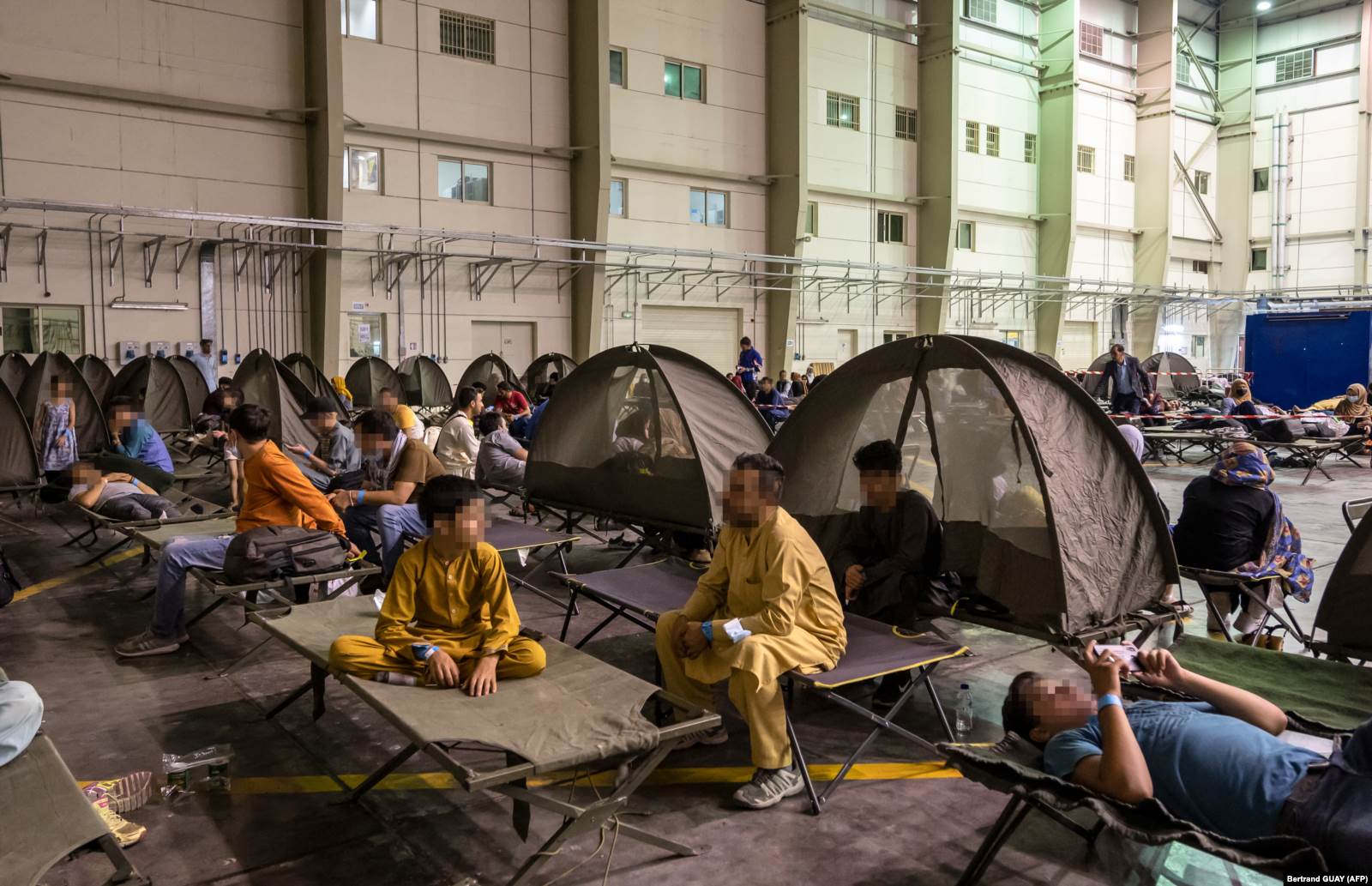
***
Right after we left Afghanistan, an enormous explosion occurred the next day (August 26, 2021) near the airport. Many people died; many were wounded.This news was so awful for all of the people here and for those there because, out of each family [that evacuated], many people remained there [in Afghanistan]. On that day [of the suicide bombing], they were near the airport and wanted to enter the airport.
I would say that [entering the Kabul airport] was a happy moment for us because those families who managed to safely leave the country were near me, and I felt how glad they were about this, how glad they were that they had saved their children.
But, unfortunately, no one could be completely glad because many families remained there. They call every day asking about whether we have any way that they, too, can leave the country.
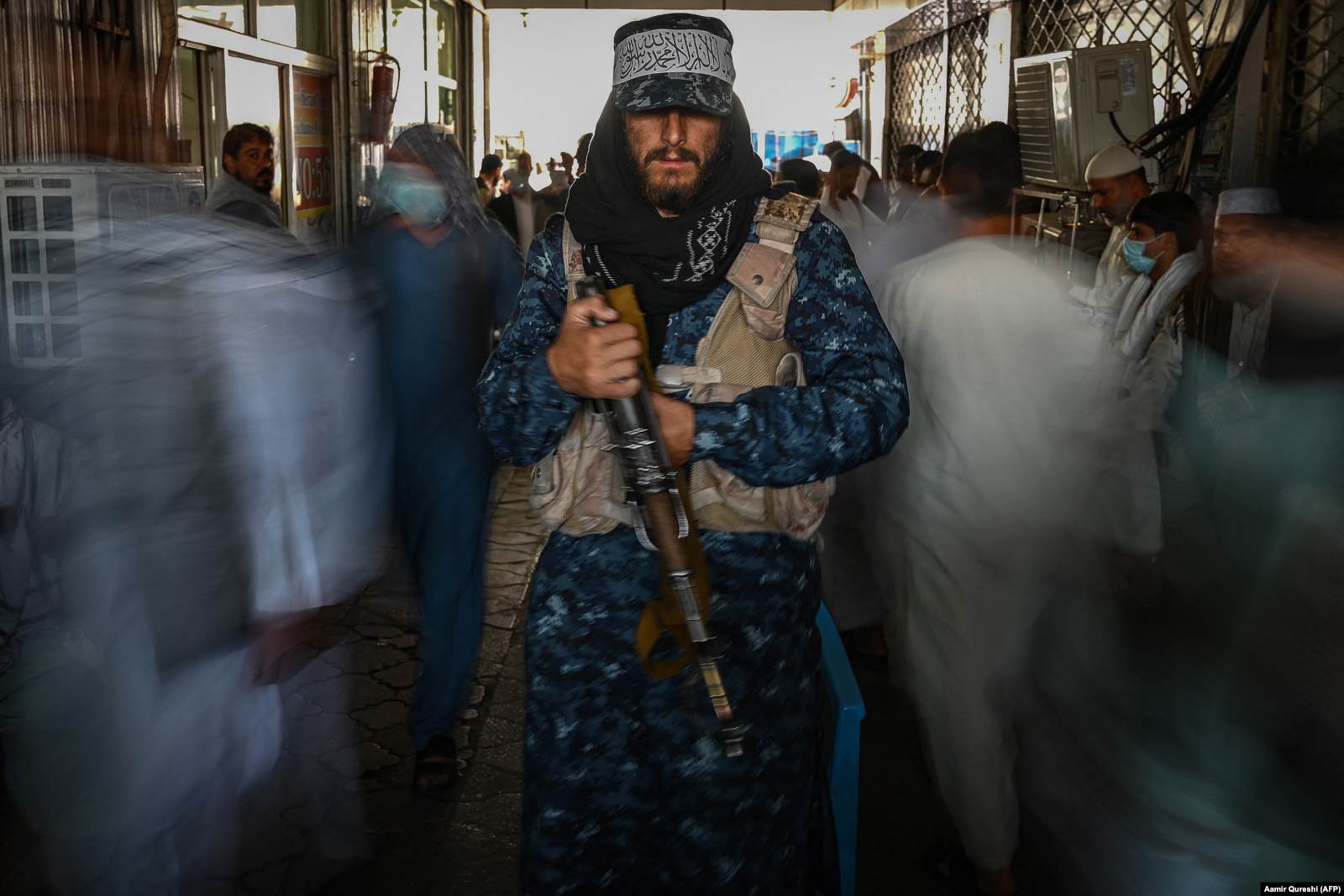
But the journey to France went very well for me. Like I said, they treated us very well: We had a lot of amenities, and still have them – both in the airport, in the plane, and also while we were waiting for the flight to France.
What did I see during all this time? Happiness in the eyes of each Afghan who was on the flight with us. To some people, this was simply a miracle.
It was the same for me because I didn’t believe at all that I’d actually left the country, that I was actually in safety. And at that moment, when we’d already entered the airport in France, everyone felt that moment of freedom, you know?
Freedom in the sense that we’d managed to do this, we were able to do this. But we can’t forget about those who still remain there.
I hope that, someday … not even someday ... I very much hope that they will be able to leave the country in the coming days. These are my colleagues, my close friends, who are in a terrible situation. They are not safe.
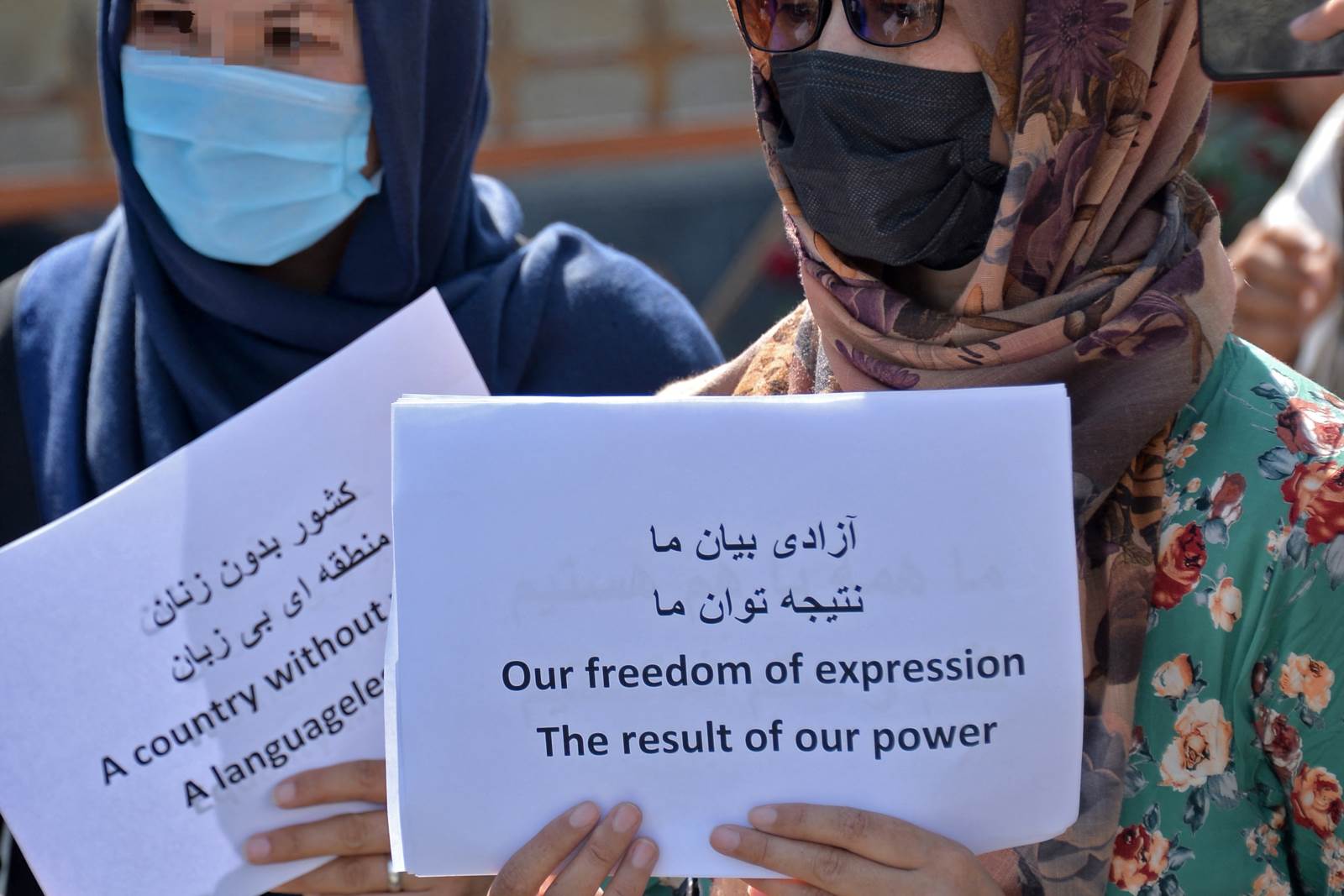
DAY 9 - AUGUST 24, 2021: ‘The Last Hope’ Will Leave With Foreign Troops, Afghans Say
While the Taliban are trying to convince Afghans that their rule will be gentler than in the past, people still are attempting to leave Afghanistan en masse. Foreign states requested an extension of the period of evacuation for residents of Afghanistan, but the Taliban announced that these operations should be completely finished by August 31.
Some Afghans fear that their chances for security will end with that deadline.
Taliban spokesman Zabihullah Mujahid indicated on August 24 that Afghans may no longer be allowed to fly out of Kabul airport on evacuation flights. “We need their expertise,” Mujahid said, Reuters reported.
Read About The Ninth Day's Events
Today, the situation in the airport still hasn’t changed. More people are still coming for evacuation -- despite the fact that the Taliban are shooting at them, the foreigners are shooting; [despite] their announcing that there’s no way people without documents will be able to get into the airport and go somewhere. But, all the same, the flood of people headed toward the airport is continuing. Every day, every day.
Today, early in the morning, I walked along the streets, and everyone is trying to leave. I didn’t see a single house near me where people weren’t heading toward the airport. People are leaving from every family.
So, that’s what the situation is like.
And it’s already like they’ve already forgotten about Panjshir (the province still resisting Taliban rule - CT). They’ve forgotten about the province. And those people are trying to come to the capital to get out of here.
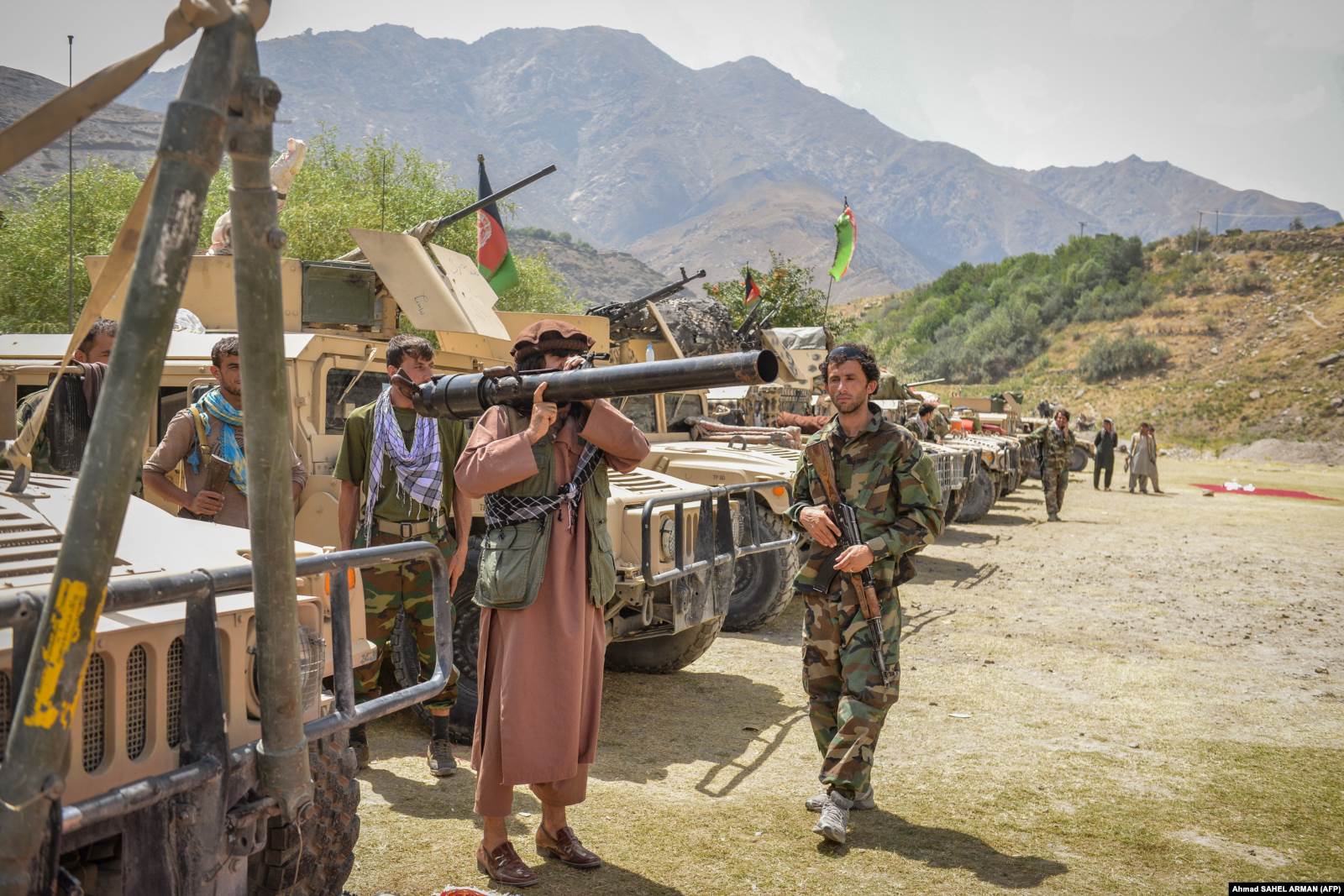
And what’s going on in Panjshir … Earlier, everyone, like, showed support [for the resistance] on Facebook, or other social networks. But now, no one says anything to anyone, not for anything.
Everyone just thinks about one and the same thing: How to get out. And that’s it. People don’t have any other thoughts anymore.
Yes, if you look at the [overall] city picture, it’s even very calm. There aren’t many Taliban. Women already have started to come out [in public] a lot. And the picture everywhere has changed. This makes it seem as if life is returning to usual.
But when you start to talk with [people] about this, about what the situation is like in their view, you then understand that they’re just trying to live, trying to get by, but, in reality, they want to leave the country somehow.
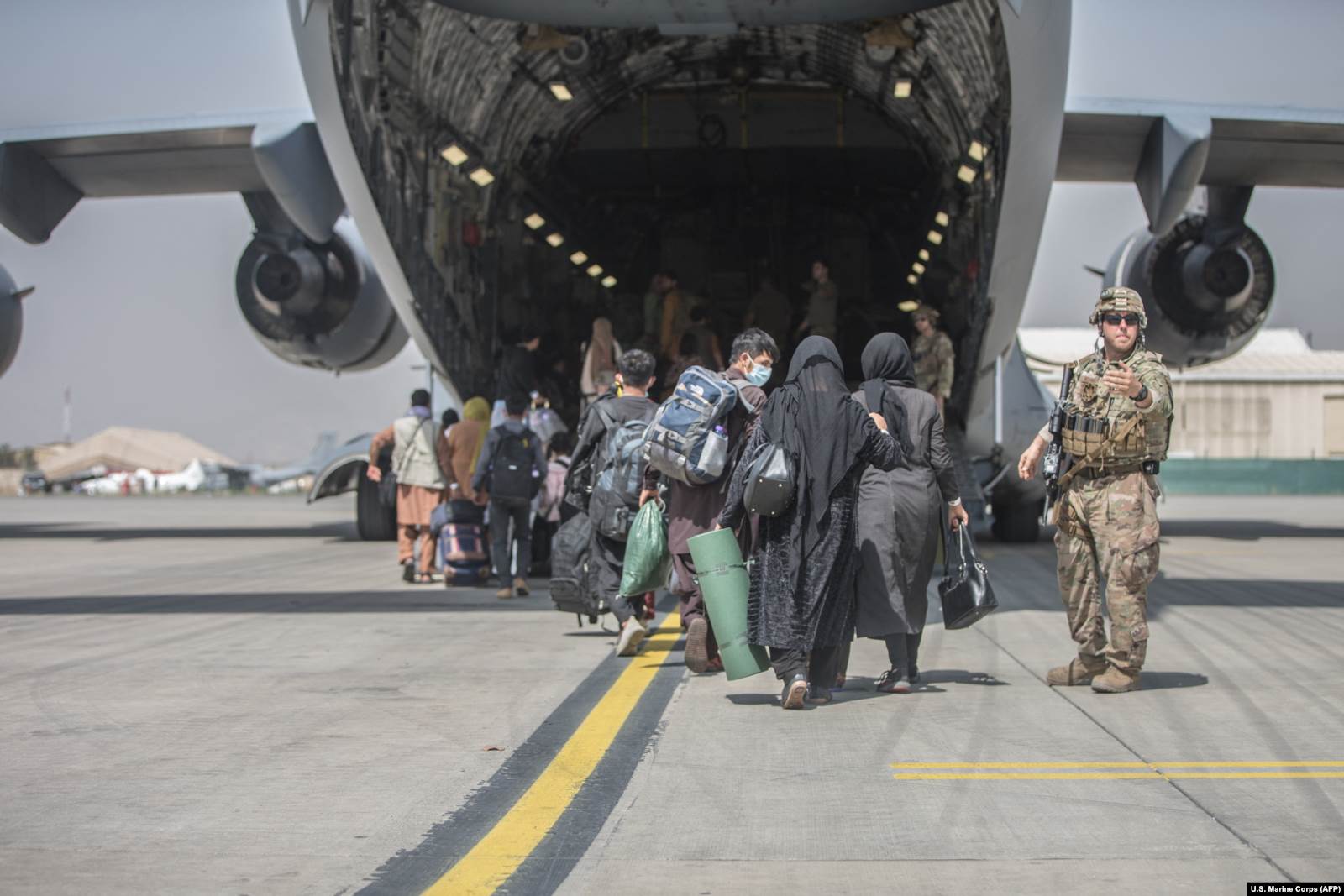
I don’t know. I’m just so surprised that it turned out that, within 10 days, everyone has started to think about the same thing.
There aren’t any other plans. They don’t exist, aside from the fact that the Taliban are busy [setting up] their systems [of governance], and they hold meetings in government facilities. They invite people in order to get acquainted with them and to promise, assure them that everything will be in order, that they’re safe. (The Taliban) are busy with their own affairs.
But, the people, it seems, don’t trust them, and are afraid that the moment when [Taliban] rule will begin, everything will change. That’s what [people] say. They say that everything now [in Kabul] is calm, but, when they come [into full power], then everything will change.
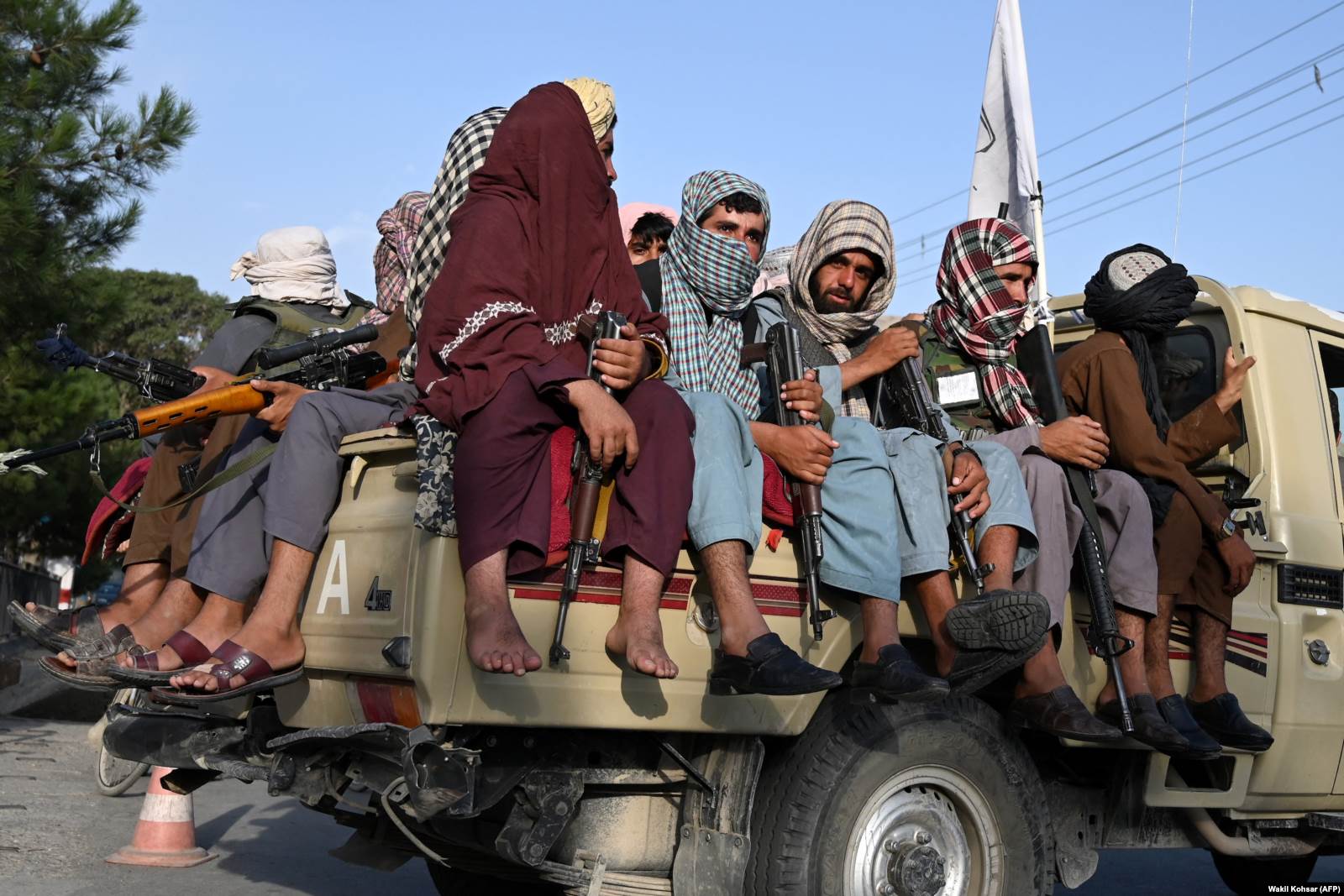
And these words, to tell the truth, have already impacted everybody. We’re all very worried. Very worried. We think sometimes that we’ve just been stranded somewhere, a place from which we can’t get out. And the airport is the last hope. Everybody wants to check once if he or she will be able [to leave].
At the same time, so few days, six days, are left [until August 31,] when the foreigners (foreign troops) announced they intend to leave, and are supposed to leave, but they want to extend this deadline.
But the Taliban announced that in no case will the deadline be extended, and that foreigners (foreign troops) should leave by August 31. This is another worry for people now. If the (foreign troops) leave now, [they say], then this will mean that the last hope has left, too.
DAY 8 - AUGUST 23, 2021: '‘If You Abandon These Children, We Won’t Take Them’
Afghanistan’s northeastern Panjshir province has become one of the centers of resistance to the Taliban. In response, the Islamist group has threatened its residents if they join this armed movement.
At the same time, Liza has come again to Kabul’s airport. Some parents are trying to pass their children to foreign soldiers in order to get a chance at leaving Afghanistan, she reports. Other children often are passing out near the airport entrances from the heat and lack of air and water.
Read About The Eighth Day's Events
Today, at this moment, I’m again near the airport, at the doors. Like previously, the situation is the worst I've seen yet. It’s becoming worse and worse.
Women are even passing their own children to foreign soldiers so that they will then take their family [through the checkpoint for evacuation]. But the foreigners are yelling, “If you abandon these children, we don’t plan on taking them.”
In another part of the country, the Taliban have approached the sole place [that they do not control, the province of] Panjshir. They want to go in there. But for now, they’re only threatening the residents that if they don’t want bloodshed, it's better for them to surrender peacefully.
Everything around [the airport] is much worse than I saw on August 20 and 19. It’s now a lot worse than on those days. I don’t know what else to expect from this country.
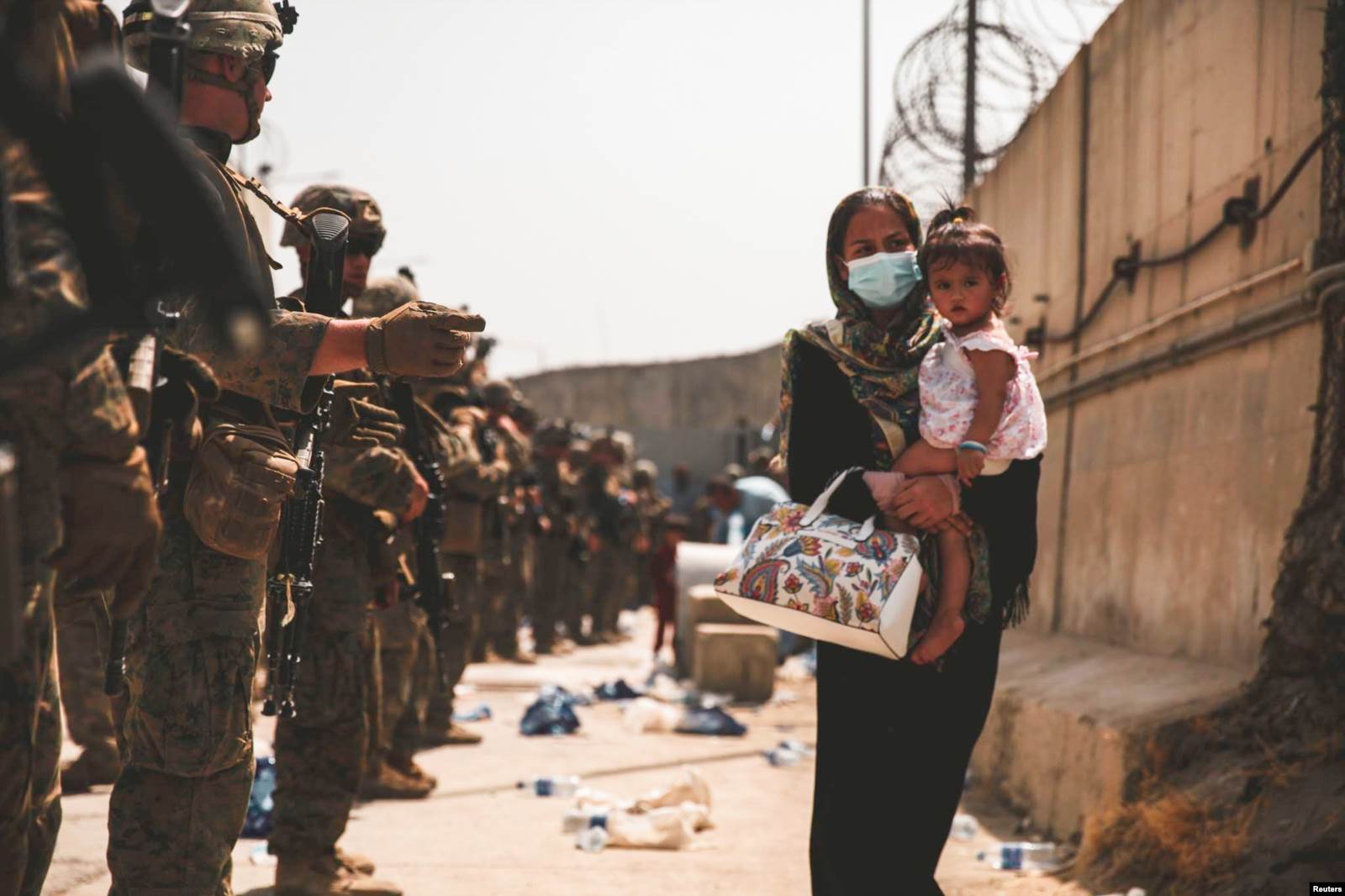
I’m now walking and there’re hundreds of people around me. You probably hear the noise, the sound of children. But many children again have passed out because it’s very difficult to breathe here.
The foreigners, of course, are already not shooting now. But at those checkpoints controlled by the Taliban, they’re shooting more than the foreigners [used to earlier].
I don’t know what will happen with this nation.
DAY 7 - AUGUST 22, 2021: The Taliban Goes On The Trail Of Journalists, Ex-Government Employees
Liza’s neighbors and colleagues recount how the Taliban have begun to track journalists and former government employees. Taliban members are coming to these individuals’ homes. A large number of journalists have been dismissed from work; some cannot even receive the salaries they’re owed. Liza also describes what it is like to wear a burqa against your will.
Read About The Seventh Day's Events
Today, some changes have appeared in the city: A lot more girls, women, and children have started to go out [in public] than before. But it’s still the same story. Everyone is talking about one and the same thing.
When you go past the park, where children play on the playground, you hear that even children are saying, “You know, the Taliban have come.” When you ask them what the Taliban will do for you, they answer, “They’ll close our stores.”
So, everyone is still upset. This has even strongly influenced children.
You see that many families are leaving their houses, carrying away their things. And this is everywhere. On each street where you go, you can see that many people already have started to move – to other places or, I don’t know, they’re leaving the country. Generally, they’re carrying things out of their homes. Everyone whom you walk past is talking about the same topic.
One other piece of news I wanted to share: The situation has become even scarier than it was earlier. Information is coming that they’re looking for journalists, looking for those people who worked in the government.
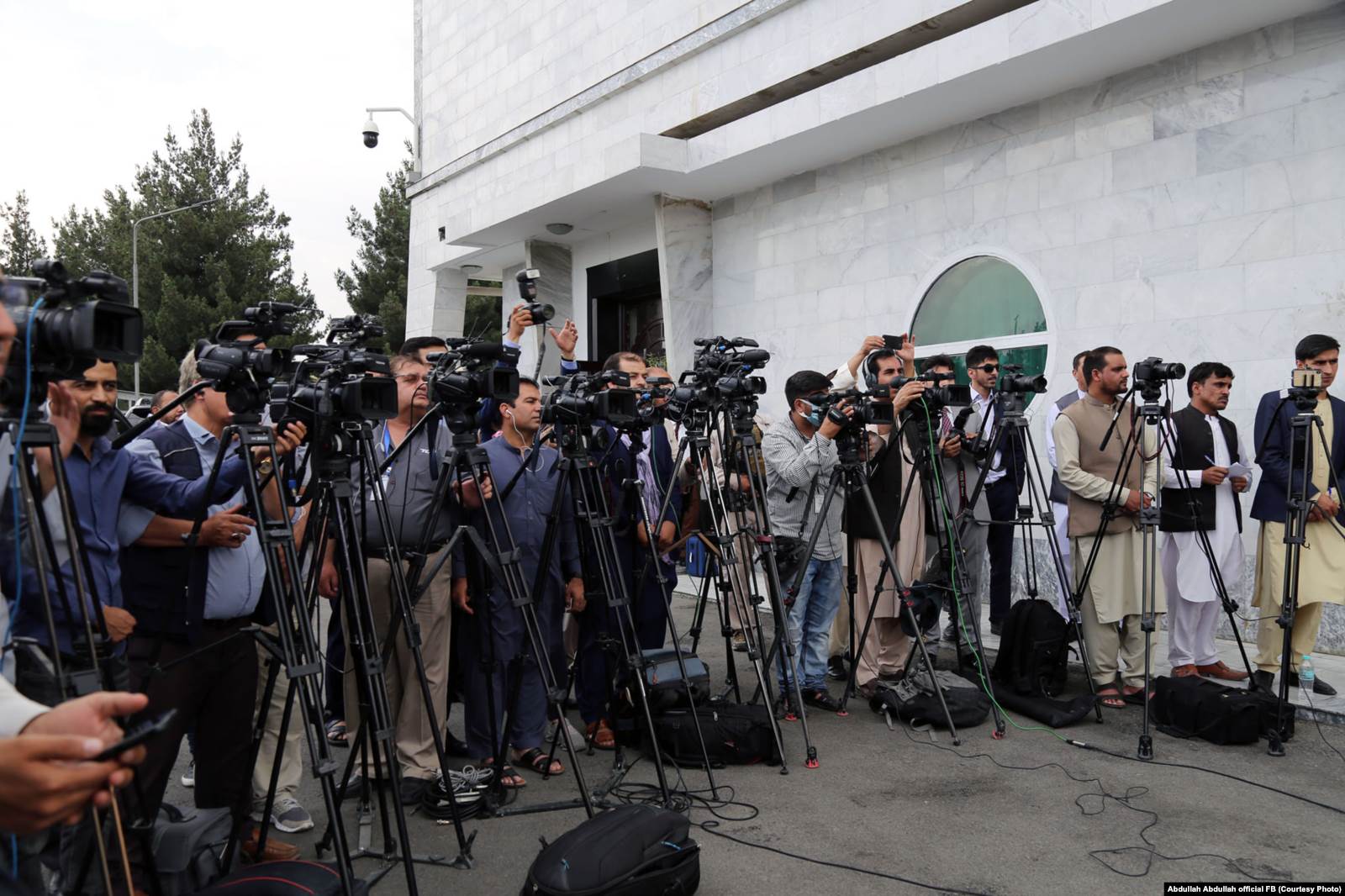
[The Taliban] come to their houses. Unfortunately, that happened yesterday and the day before yesterday at my own house. I didn’t know about this.
Other people live here (in the apartment building) as well. For now, they asked them whether they have cars and when will they give back these government cars. I don’t know. I don’t have any more words. The situation is getting worse. It’s very scary for people. Even those changes that are taking place are from the fact that people need to live somehow. They continue to carry on some form of life in order to survive.
We’re in limbo. Complete limbo.
It’s a pity about journalists. In particular, female journalists. They’re really worried. Some of them have tried to start working several times. They went to the office, but the Taliban told them that they’re not allowed to go there.
It’s the same in other institutions where women used to work before. Those women are trying to get in, too.
Many of those with whom I spoke want to get their salary. Some of them haven’t received a salary for already three months. They want to feed their family. You know, the prices for groceries increase each day. I don’t know at all how they feed their families.
This is a very difficult situation. People haven’t had a salary for three months. I don’t know. Imagine, their children can’t eat.
On the other hand, there’s the type of clothing. If you voluntarily wear a burqa, despite the heat, no matter what, if you do this by your own will, then, it’s not a problem. You feel fine because you’ve chosen to dress that way.
But when you’re forced [to wear a burqa], when they tell you “Wear this,” that’s a lot worse.
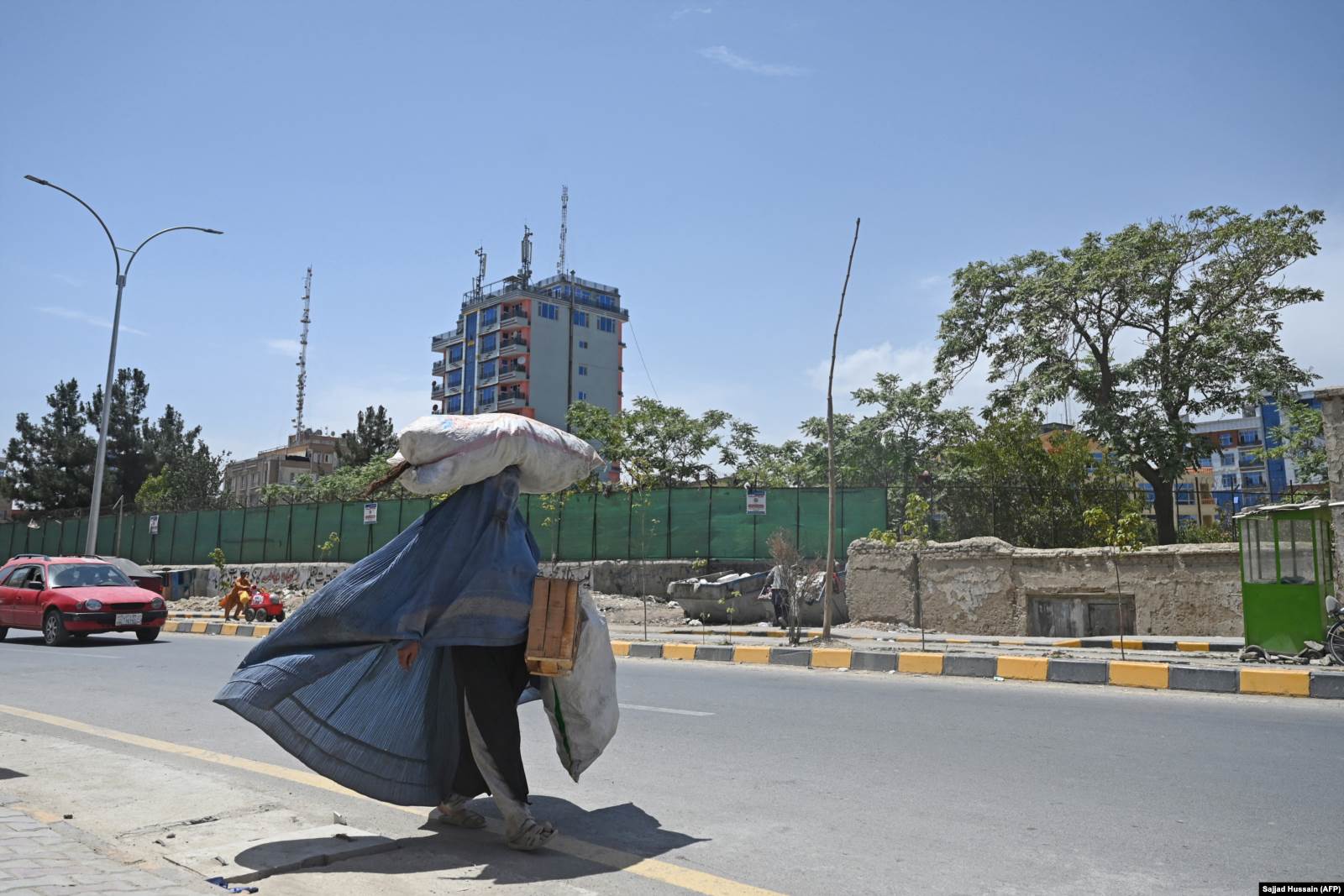
On one hand, it’s a pity for you. On the other, you constantly need to follow all the rules. If you, God forbid, won’t follow them, then something will happen.
You’re afraid. For that reason, you dress like this.
Many women complain. Many are tired. But they can’t do anything about this. They need to dress this way, need to think about whether there will be work or not. They say that they’re tired of thinking so much.
That’s what’s going on around me today.
DAY 6 – AUGUST 21, 2021: I Don’t Think A Person Can Bear That Again
Liza has returned to the city. More women have started to come out cautiously into the streets. They are all concealed under burqas. But what is happening in the airport cannot be forgotten.
Read About The Sixth Day's Events
Today, there was some positive news, of course. Positive in the sense that today I see many women who have decided to go out [in public]. But their appearance and their clothing have completely changed.
No one is in the clothes that they used to wear. They no longer go out [wearing those clothes].
And, also, each woman, when she sees another woman, looks as if she’s seen something new in the city. This also, of course, doesn’t exactly give you a good feeling because you sense that they don’t feel in their own country like they did before. And even the sight of another woman, is strange for them. Either she’s glad that there’s another woman [out in public] or I don’t know what she's thinking.
On one hand, this is positive for me, but, on the other, I was surprised by these looks.
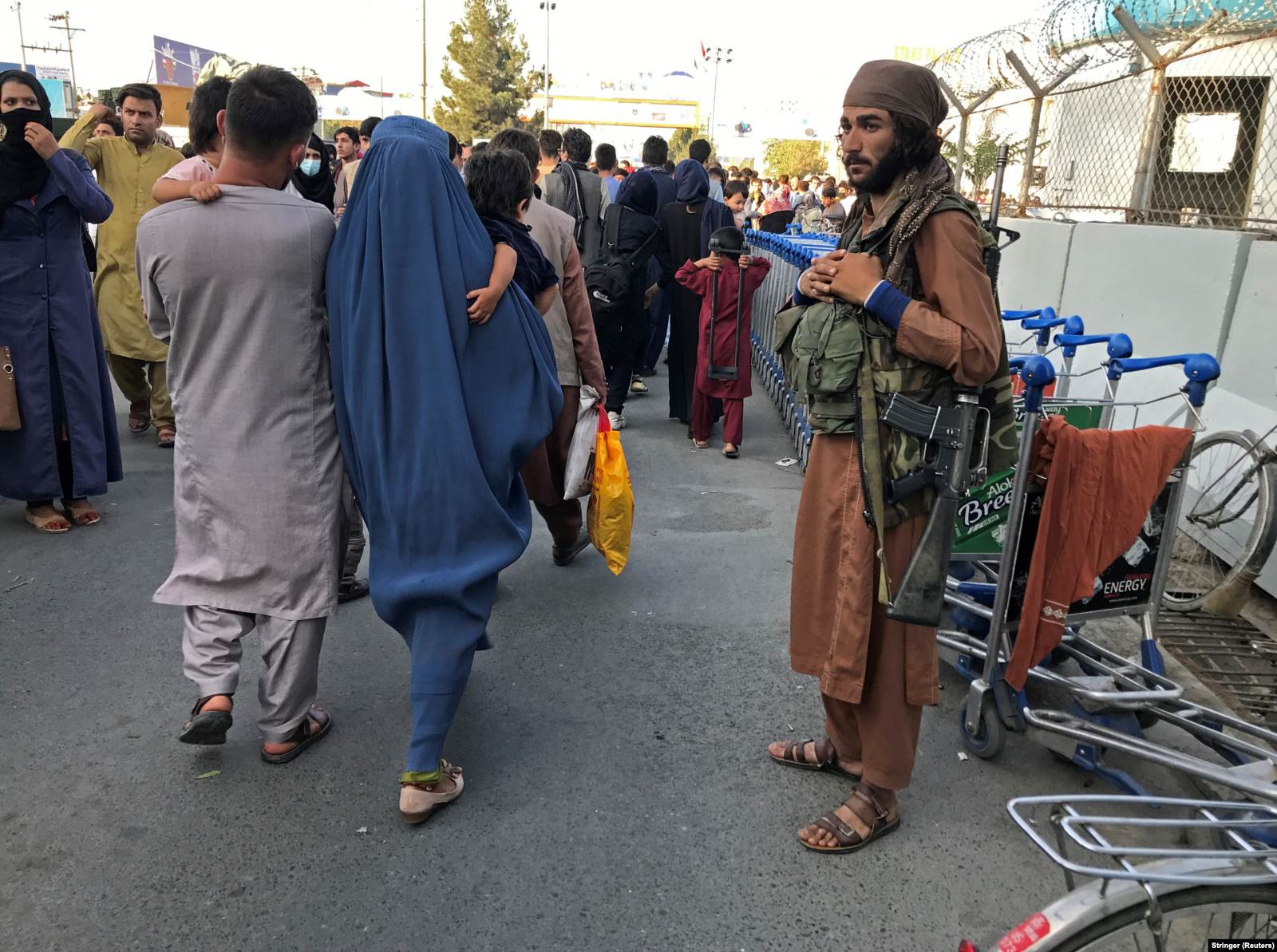
In another part of the city, you see already another awful picture. Despite the fact that they’ve gone out into the streets, opened stores, want to start a new life somehow, it’s still in their thoughts somewhere that they need to leave the country.
The scariest and most awful thing in Afghanistan’s life today takes place near the entrance to the airport and close to the doors, where foreigners are waiting [for evacuation]. This already shows the terrible picture of today’s Afghanistan.
Every person, without worrying about his or her own life and the life of their own family, children, is trying to leave the country. At any price.
And these screams, this crowd …
On the other hand, when you see that both the Taliban and the foreign [soldiers] -- in order to reduce the size of the crowd, the number of people -- start to fire; and when you see how loudly the women or children are screaming, this already shows another picture.
I totally would not want to ever experience all this in life again. Never. I pray that I’ve seen this for the last time in my life. I don’t think that a person can bear such a thing once again.
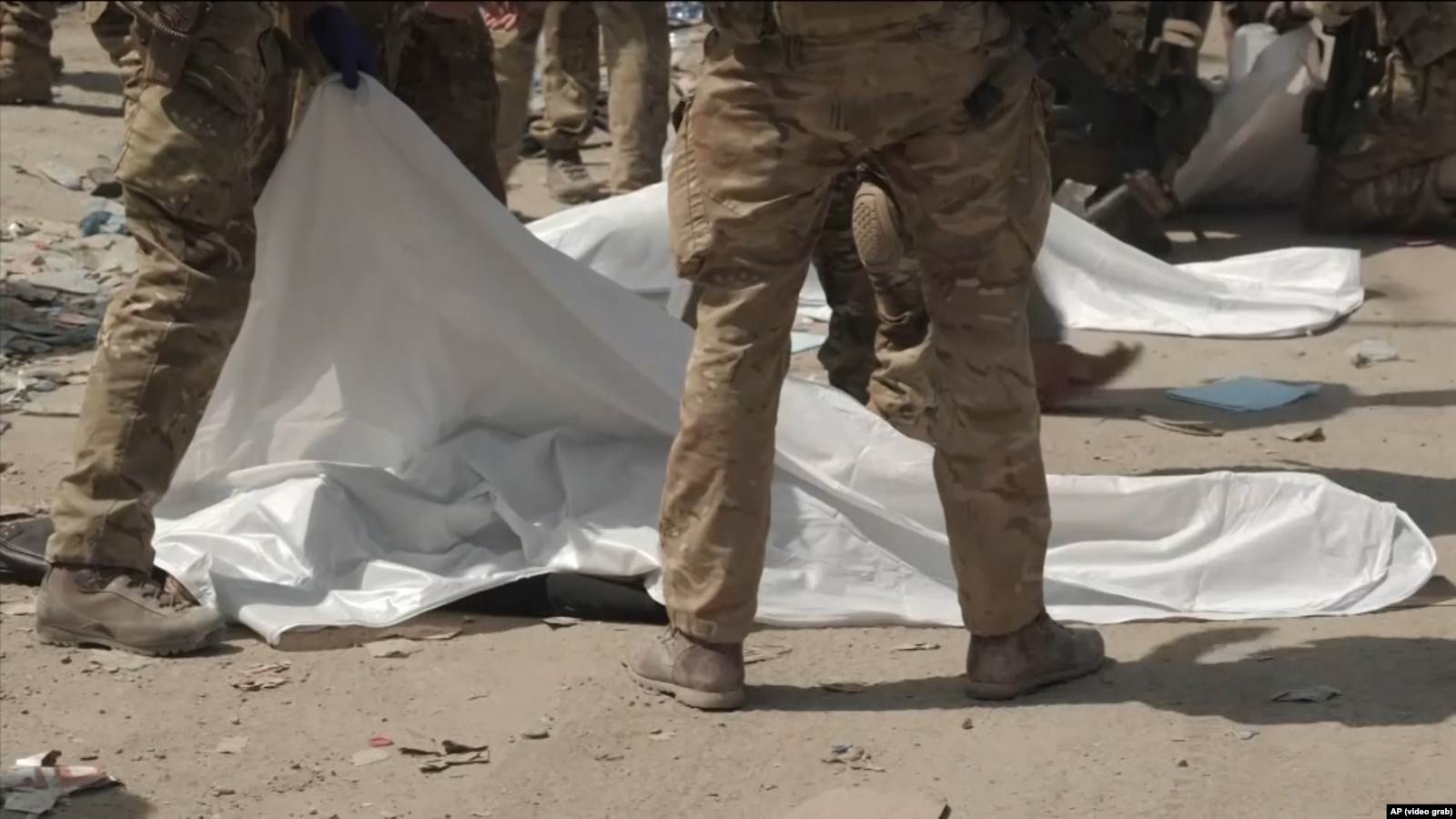
In particular, when you see these beautiful children that you saw earlier. The way you used to see them. How beautifully they were dressed. How good it was to see them.
But now, you see how terrible they feel in the airport when there isn’t even air there in order to breathe, when their mother’s crying, when their father tries to take them out for their own safety. It’s not a scene that any person can see and put up with.
This is what is going on for now in our country.
DAY 5 - AUGUST 20, 2021: Death Has Begun To Follow Us Everywhere
Liza again has ended up near the airport. People are in a serious/difficult psychological state. To control the crowd, U.S. soldiers fire in the air from one side; the Taliban shoot into the ground from the other. Little children are lost in the crowd because of the chaos. People are faced with a choice: Keep waiting for evacuation or return to the Taliban-seized city.
Read About The Fifth Day's Events
Today, I want to tell you another story about yet another day in Kabul. I’m in the airport. The situation here is much scarier here than on the streets [in Kabul]. Of course, the fear here is a different fear.
The fear there [on the streets] is that someone will kill you, that the Taliban are there, that you’re not safe. But here, women cry because of their children who are getting lost among the many people who are trying to evacuate out of Kabul.
There’s fear here that shooting will start, and you’ll die. Because when you’re in the airport, the soldiers use weapons to scatter the hundreds of people who are standing near the airport. And this is even scarier.
It’s very hard on us when they kill the children of our citizens, when our children are getting lost, women are crying.
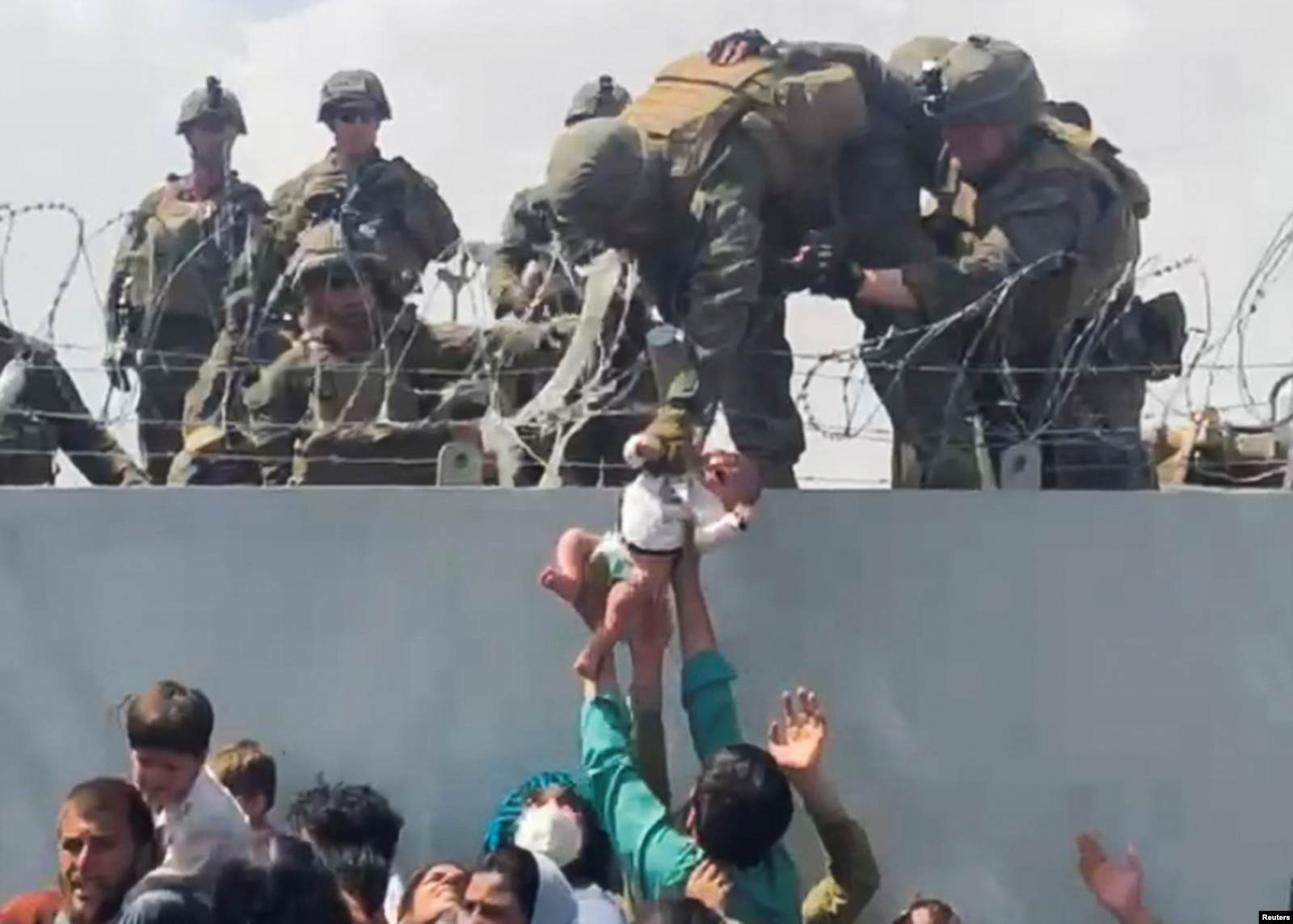
Afghans are now in such a situation that they need to decide whether to go back into the city to live – and this is death – or try to save their lives and the lives of those close to them by coming to the airport. But here, there’s also death.
Many women have lost consciousness [from the heat]. Children have been feeling bad and have been loudly crying. I can’t forget the moment when one woman was saying, “That’s it, I want to go back. I made a bad choice. I can’t take it anymore. My child will die, my child will die, my child will die!” There was a sense of just tragedy.
We’re not safe, not matter where we’re located. I think that death has started to follow us everywhere. This impacts mental health so much. People are nearly going crazy [from the stress].
DAY 4 - AUGUST 19, 2021: No One Smiles Anymore
Yesterday, the Taliban opened fire on a crowd of protesters demonstrating in defense of the national flag in the eastern city of Jalalabad, one of Afghanistan’s largest cities. Several people died and dozens were wounded.
People again vanished from the streets of Kabul, and the smiles from people’s faces.
Looking for any kind of positive news, Liza tries to get to parts of the city far from her home. She also manages to access the area near Kabul’s Hamid Karzai International Airport. But the sound of shooting could be heard there every minute. People, she said, were in a panic.
Read About The Fourth Day's Events
-We’re now near the airport. At the airport’s southern entrance. There’s a terrible situation here: They’re shooting and there’re a lot of people. You hear what’s going on: They’re shooting all around.
Everyone’s afraid, children are crying. There’re a lot of women here.
(Cries ring out in the background; shots are heard.)
A lot of people don’t have a visa or anything, but, all the same, they’ve come here. I don’t know what they want. So, the situation is getting worse with each minute.
And we can’t move around. They stopped us here, and requested that we not move from our places. They stopped us.
Now, we can’t go home, and we can’t stay here. They again asked everyone to stop. And the doors [to the airport] are closed.
You probably will hear what’s going on. There’re people here who’ve slept in the airport for the past three days. We really don’t feel safe. It’s very scary for everyone.
There’s nothing we can do, there’s nothing we can do. Many people show their passports, U.S., German. But, all the same, they don’t let them in.
No foreigners are seen here. Afghan soldiers are around [us]. And that’s it.
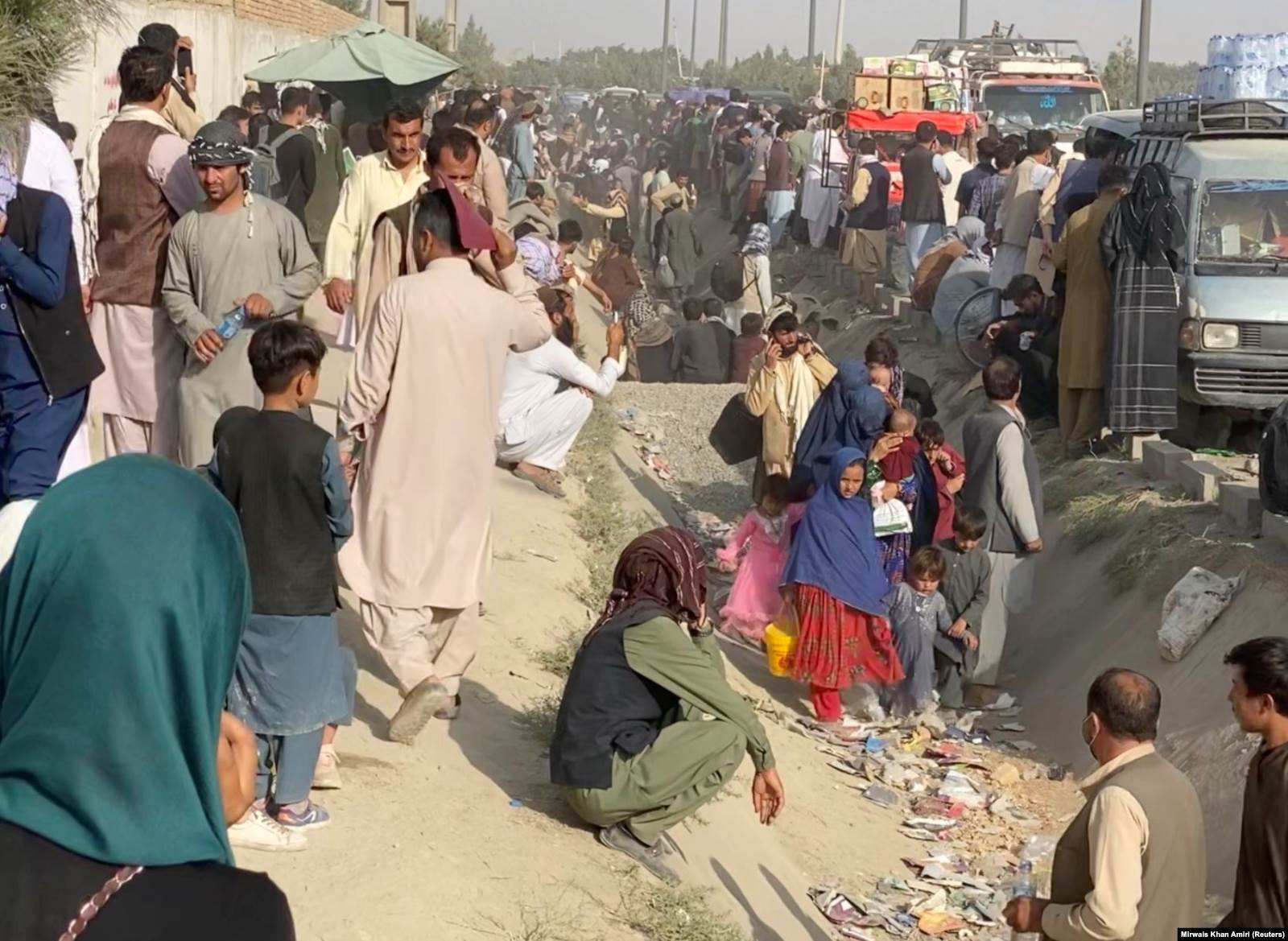
Today, with a lot of difficulty, I decided to go out into the street after not sleeping all night. Not only I, but people close to me: friends, journalists, and others. No one could fall asleep.
It feels like many of them have already lost their last hope. They’re staying here. All paths are closed. There’s nowhere we can go; we can only endure.
I went out onto the street to find something positive, about which I can talk with my friends, to give them hope that there still is something good, in which we can be confident. At least for a day, to be calm. [I wanted] to find at least some kind of comfort.
Unfortunately, it didn’t work out for me. I couldn’t manage to find any such news.
People are still standing in the airport in expectation of the possibility of leaving the city. In the city itself, it’s quiet. There’re very few people [on the streets].
All the governmental institutions are either under Taliban control or closed. Kabul University is now closed. Before this, there were always a lot of people there. So, this picture that I saw today was very much worse than yesterday.
I thought that maybe I’ll find in some part of the city at least something that could give me positive emotions, and that would be a good day. But I didn’t find anything. And when I returned home, it became even more strongly scary.
Still, the situation remains unknown. There’s very little hope. I don’t know.
What I noticed very strongly today is that the situation has very strongly impacted people’s mental health. No one smiles anymore. No one can talk with anyone for long.
And the sole topic that people discuss is how to leave the country. This is terrible. This has very strongly impacted us. I already can’t find any friends with whom I can have a normal discussion. The city has very strongly changed, and the people, too.
Everyone is afraid. In particular, women are so worried. They can’t go out [on the street by themselves].
I think that some of my journalist colleagues and I – and this is very much concealed and [done] with a lot of caution – go out of the house. And, also, they come back afraid.
And they're all afraid when they’re in their own house. I think there can’t be anything worse than this.
Day 3 - August 18, 2021: Everyone Just Wants To Leave
On the third day, more people began to appear on the streets. Stores began to open, but not those with contemporary clothing. In the new reality, people may no longer need this. As before, people sleep in the Kabul airport and hope that they’ll be able to leave their country.
Read About The Third Day's Events
– Today is already the third day. I went out [onto the street], wanted to take a look at whether people are working, some stores that sold clothing have opened. I just wanted to look because those clothes that they used to sell, I don’t think … I don’t think that they’re open. The clothing that they sold earlier …. I don’t think that anyone will buy clothing like that.
But what you don’t see here … Women are still not here. Only men. Some stores are open, and they sell plastic materials for the home. Some kiosks are open.
[Sound of a man speaking in Dari.]
I bought a mask. The salesman said that no one else came to buy anything. He says that this is his first day when he came and opened his store. There aren’t any more customers.
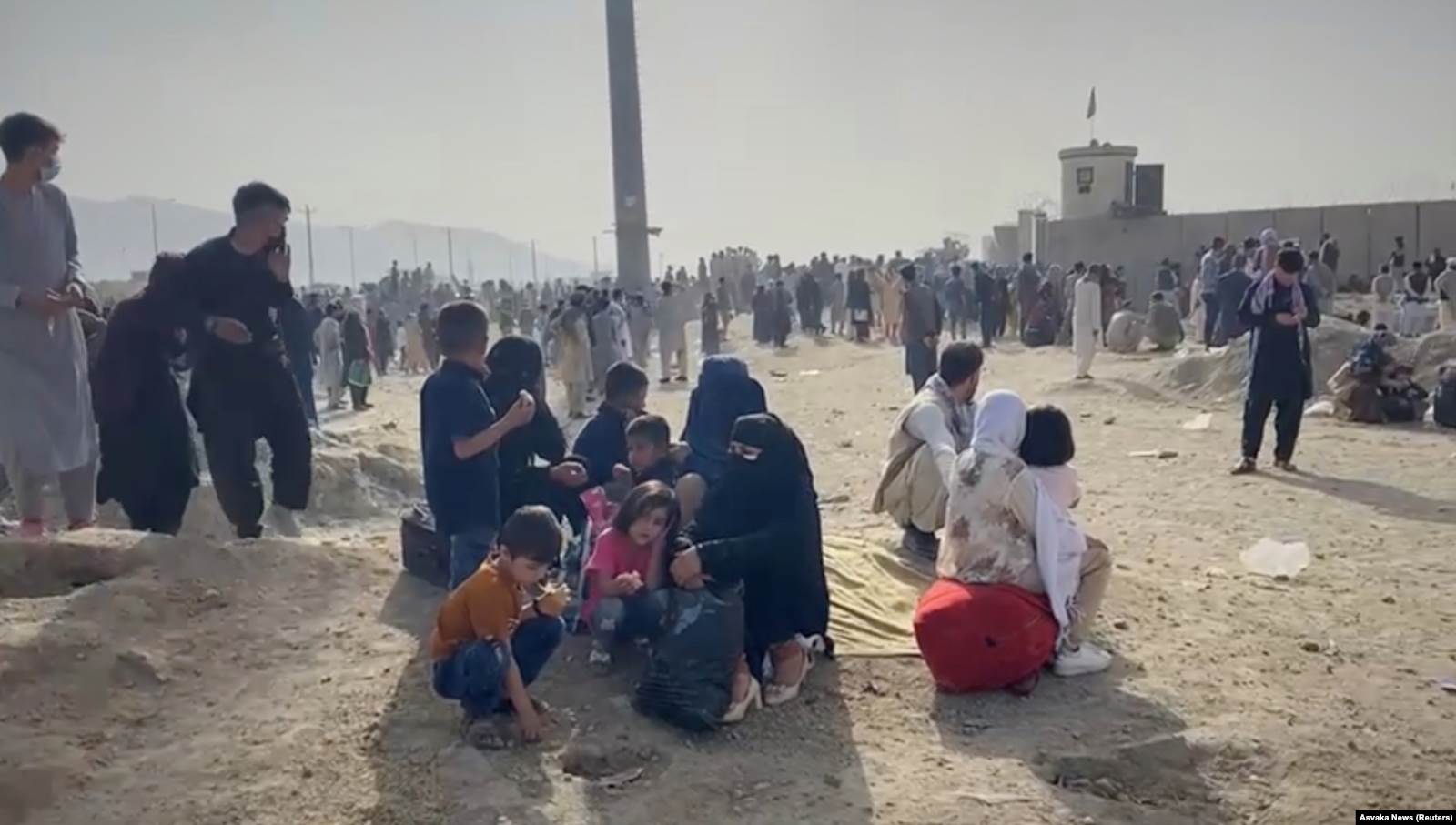
I saw some women. One woman is looking [at me]. She’s happy for me, and I am for her [that she was able to come out into the street].
I’ve just now returned home. There was a feeling as if, today, the people, residents, already sort of are trying to get used to things. Many opened their stores for the first time, but say, “What are you going to do? We don’t have anywhere to go. This is our country, and if there were a way out, we, of course, would not stay.”
Imagine, everyone just wants to get out of his or her own country because they don’t feel safe. This is a really awful feeling that you experience from such residents of your own city.
On the other hand, when you go near the airport, so many people are still seen there waiting for the possibility to leave. And I’m even confident that many of them know that they won’t be taken from here, that they won’t be able to leave for anywhere. But, all the same, this is like their last hope.
And they’re waiting there and saying that maybe [they’ll be able to leave]. They’re there only for the word “maybe.” And there already are families who’ve been there for three days, even spent the night there. They say that they were scared, but what can they do? And there’s shooting around them each minute.
I think that they’re in a very incomprehensible situation, and I’m in the very same one. I come home, sometimes it seems as if you’re stuck somewhere where there’s no exit, and you don’t know where to go. As if someone allows you to leave for an hour and come back.
It’s a feeling as if you’re slowly giving up your own right, your own freedom. [You have] this fear as if, God forbid, you’ll be deprived of your freedom, the freedom to go somewhere, even the freedom of speech.
Because on the street, it seems like no one wants to talk about anything. It’s like everyone is silent and everyone is going somewhere, is working on something, and no one says anything. Sometimes you think: If they’d at least say something – that they’re not happy or are happy. You won’t hear anything at all, you won’t get a sense of anything from them.
In recent days, it’s seemed like people are just waking up and going out. Nothing is known. They come back. It’s again night, you go to sleep, and again wake up.
DAY 2 – August 17, 2021: We Don’t Know If We’re Alive Or Just Breathing
On the second day after the fall of Kabul, Liza could leave her house, but only in a burqa and accompanied by her father. Only a few women, also accompanied by men, had come out as well. The streets were frozen in fear. More and more men have changed into traditional Afghan clothes, and women into burqas.
Read About The Second Day's Events
– Today I came out into the street. Here, as you hear, there’re cars, children, people. Everyone has come out. I don’t know if they’ve already gotten used [to things] or how. Today you can already see more stores that have opened, and also many kiosks have opened.
I’m walking with my father. I couldn’t come out by myself because I don’t see at all any women here. Here, there’s one woman going along, with her husband or brother. I don’t know who he is.
Close to the airport, of course, shooting is still heard. Now I’m getting closer to the place where the stalls used to be. No one’s here now. They’re no longer here.
You can probably hear the gunfire.
(Shots ring out far away.)
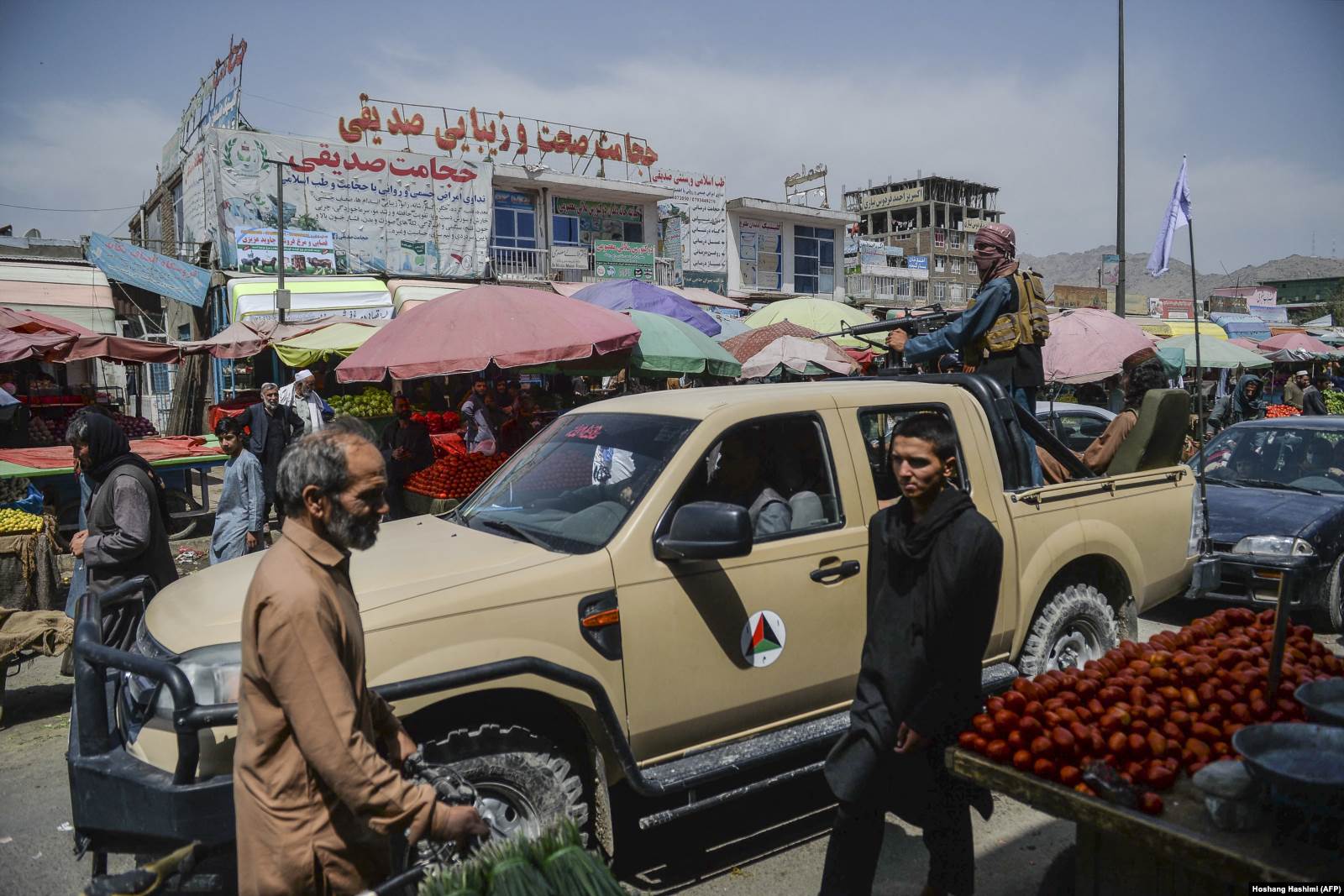
My dad and I now plan to take a car and go [on our errands]. I was afraid. I couldn’t go by myself. I just saw one other family with women also accompanied by men. They didn’t go out alone.
You can see that all people are dressed in our traditional clothes. Earlier, no one dressed like that. There’s not anyone who’s doing this to go to work and put on a suit. There isn’t anything like that.
(A man speaks in Dari.)
This was an airport worker. He says that “I cried all night yesterday.” He says that he can no longer work there [at the airport]. They’ve stolen everything, he says. Nothing remains in the airport. He says that it’ll take another 50 years to improve everything.
After I saw the situation [on the streets, I felt] that everyone was scared. Everyone is in such an unclear situation. They don’t know what they should do, whether they can leave. I’ve never seen such fear.
I went and thought that this isn’t my city. I thought . . . I don’t know. It was scary for me, too.
I hid myself while I went [out on the streets]. I wasn’t showing my face; I was completely covered.
I was scared for my father, whom I’d asked to go with me into the street. I was afraid that if I’ll go alone, that something can happen to me. Therefore, I requested him to go with me.
Imagine, I can’t go out on my own. It’s really hard.
It was scary for me to see people who are afraid for themselves. There’s such a feeling …
We don’t know if we’re living or if we’re just breathing. It’s such a different thing when you smile and go somewhere without fear.
Today, I went to the supermarket where I used to always go shopping. The salesclerks were in the store who used to chat with me with a smile, with whom we spoke a bit about which items are good, what new items have come, what’s old on the shelves, but today I saw such fear in their eyes.
When they saw me, they were afraid to say at least something to me. But there was the feeling that one clerk wanted to say to me, “Look at what’s happened. What should we do?” Based on the expression on his face, I understood [that he wants to tell me something, but is afraid].This is awful.
You have to keep an eye out. For now, no one knows what will happen tomorrow. And what remains today is only fear.
Day 1 - August 16, 2021: Men And Women Are Already Dressed Differently
The first day after the Taliban seized power. There’s a multitude of unknown people on the streets. The Taliban promised not to use force and to guarantee the safety of Afghans who worked with other countries and the government that fell. But more and more reports are coming in that the fighters are trying to trace the residences of these people. Close to the Kabul airport, the first shots have sounded.
Read About The First Day's Events
– You know, the situation has changed sharply since yesterday. For example, yesterday, after the report that the Taliban had entered the city, everyone abruptly started running home, everything was closed, and you couldn’t see anyone on the street.
But today, it’s the opposite. Since 8 a.m., there have been so many people everywhere, and what’s awful is that there’s no way to distinguish whether these are Taliban or simple residents of Afghanistan. So, big changes have taken place, but you don’t see calmness because you can see everywhere the Taliban passing by here.
I live near the airport, and you can hear shooting going on from there. Already as of morning, you could see how everyone is running toward the airport.
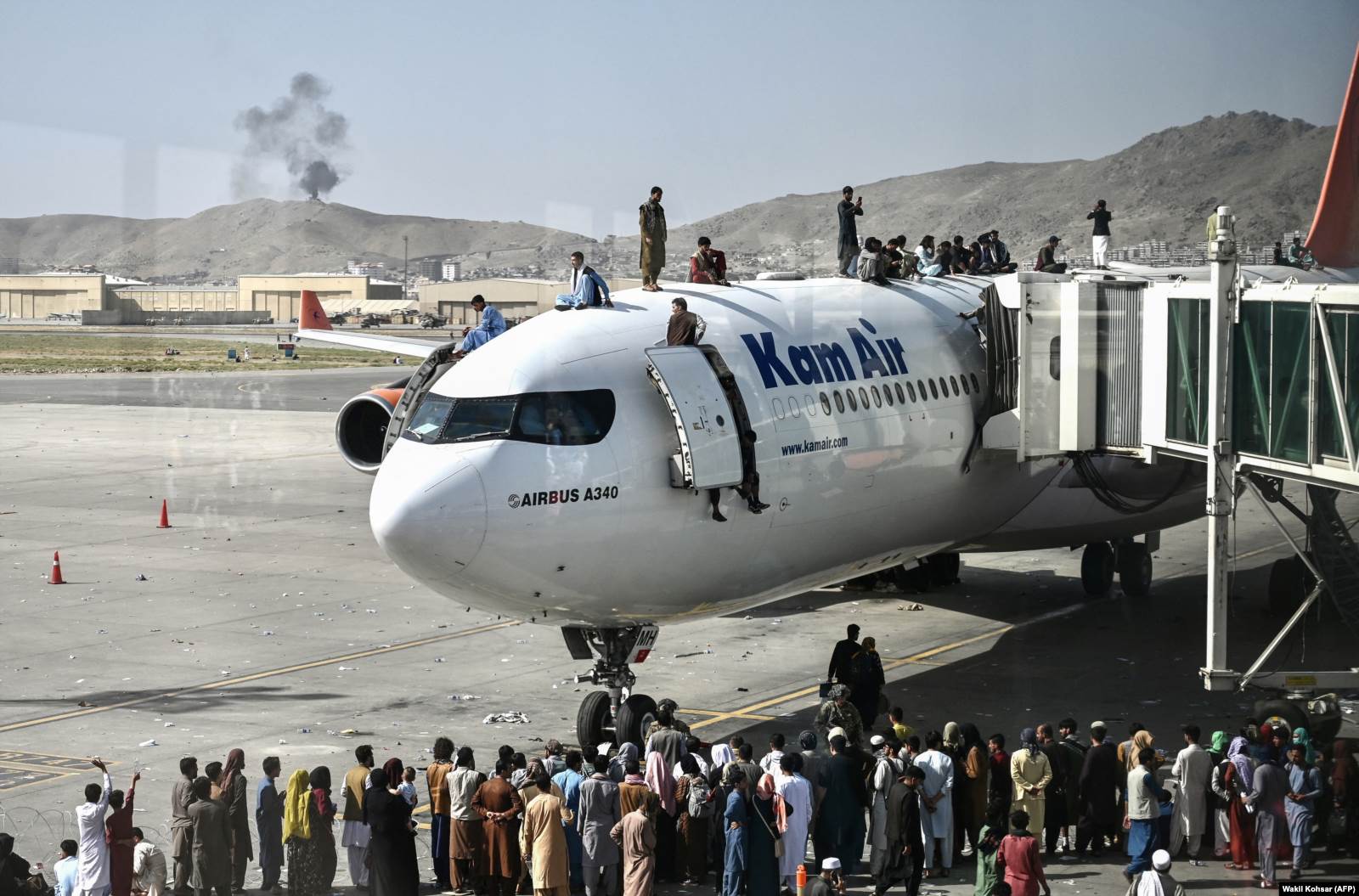
So, in the situation, there’s practically no (inaudible) … Today I noticed the fact that women (inaudible) changed, the fact that they’re already dressed differently. They’re in hijab, and the men also are already dressed differently. There’re really a lot of them.
Right now, I see from the window so many people that you can’t tell whether they’re Taliban or ordinary people. [Yesterday, there was alarm, of course ….] No matter where I went, whom I saw, there was only fear everywhere. You know, there was fear in people’s eyes.
Every person was so strongly frightened. One person was afraid about losing their property; another was afraid that, God forbid, something will happen to my children.
But, now, you can’t see anything like them welcoming the Taliban, but they’ve kinda come out into the street just to have a look. They’re just looking at what kind of Taliban they are, and that’s it. Are they like 20 years ago or has something changed? I think that people came out just to observe the situation, at what's going on with us.
You know, all the migrants whom I saw yesterday, who came from the provinces, they still had the hope that there’s some kind of government that there’s someone who, at the last moment, will defend them. Yesterday, when I saw (the migrants), one man said, “That’s it. We don’t have any more hope. Who will protect us, who will protect my children?”
And, in particular, they were very scared for their little girls because, you know, (the Taliban) even marry them. So, for that reason, they moved [from the provinces].
There’s no hope, but that doesn’t mean that they didn’t attempt to leave the country. They were very much trying to, even from the moment that they got the report that foreign troops intend to leave Afghanistan.
From that moment, everything started: One person went for passports, someone else for a visa. And, unfortunately, it didn’t work out for everyone.
And those people who were going to the airport yesterday, are these people who didn’t receive a passport, didn’t receive a visa, and someone may have gotten a visa, but can’t fly out. These are all those people.
But this doesn’t mean that they didn’t want [to leave] and didn’t expect the Taliban. Of course, everyone was terrified.
And it’s the kind of fear that, when (the Taliban) immediately took the capital, it was a shock.
Yesterday for the last time, I went outside for groceries. It was around 2 p.m. Near my house now, you’ll see that the Taliban are here. So, of course, it’s scary for me.
Not to mention, when I worked with foreign organizations -- not only to me, but all of my colleagues, journalists, who worked with them -- I’ve received [information] from all of them since yesterday.
You know, no one slept all night, and no one feels safe. And everyone asks the same question: “How can we get out of the country?” That’s what’s happening with both journalists and ordinary people.
There’re rumors that they’re keeping track of people who are journalists, who worked with the government, who worked with foreigners. They’re searching for them in their houses. So, judging by this situation, of course, I’m also not safe.
Yesterday, they sent out information that the Taliban won’t use weapons against the peaceful population. But what happened 30 minutes ago? Someone used a weapon in the airport. And from both sides.
And it turned out that the foreign troops felt that the Taliban are using weapons against them. And, so, shooting started from both sides. And, judging by the situation, many even died, but I don’t have exact information about that now because I was talking with you. I wasn’t checking what’s going on there.
But 30 minutes ago, I got a report that shooting had already started. But not because they wanted to use weapons against peaceful residents, but because they wanted to defend themselves.
Also Check Out:
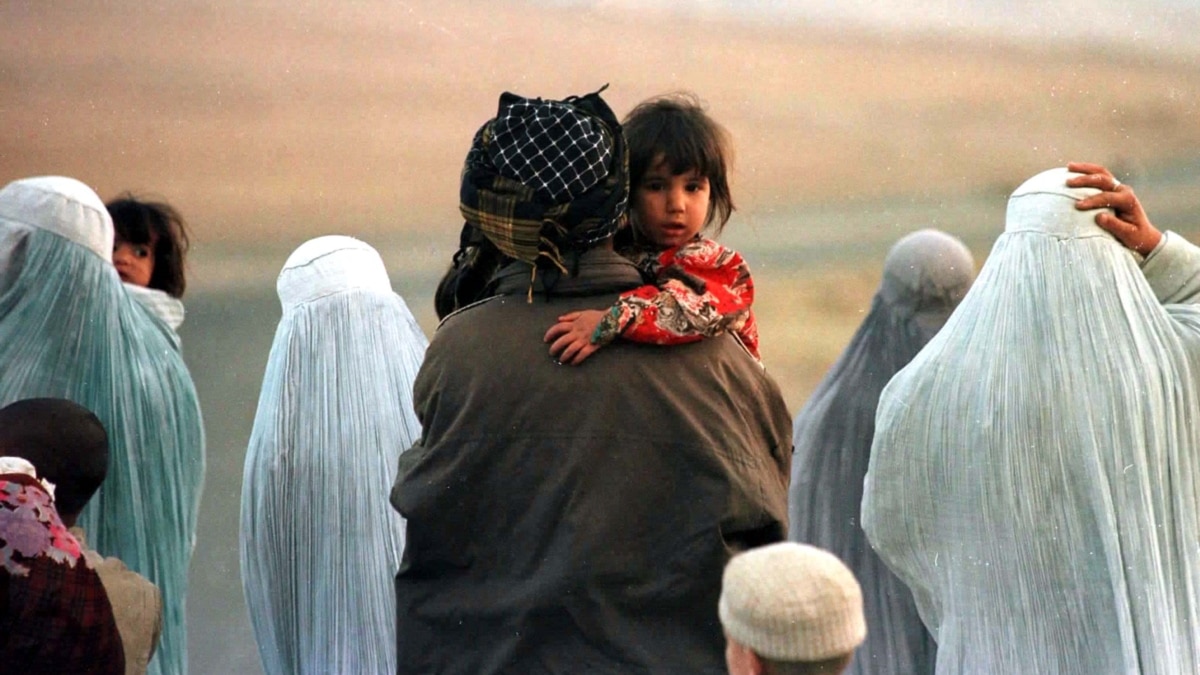
'I Spent My Youth Terrified': Afghanistan Residents Remember Life Under The Taliban
Current Time spoke with three adult residents of Afghanistan who recall the disruption that occurred when the Taliban came to power in 1996, and fear what the consequences may be if they manage to return to rule Afghanistan now, after the withdrawal of U.S. and NATO troops.
